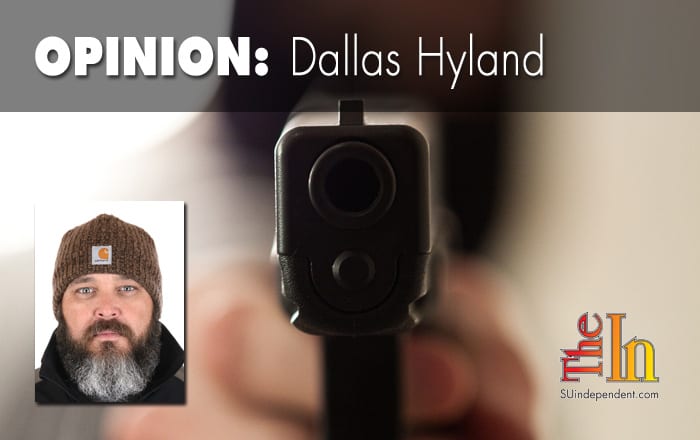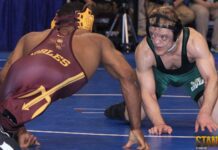 |
| Image: Geoffrey Fairchild |
Written by Dallas Hyland
I remember it well. It was the year President Obama had taken office. Gun and ammunition manufacturers could hardly keep the shelves stocked.
This was in part due to a frenzied panic some Americans had whipped themselves up into that the new administration was going to somehow abolish the Second Amendment and come for their weapons. Such Americans packed their homes with more weapons and ammo then a small Army regiment could carry—let alone they themselves—and the manufacturers of these products likely had a windfall year.
I was at a store in Cedar City buying some ammo myself actually and witnessed a curious interaction between the sales person and one of the panicked.
The panicked told the sales person he wanted to by a gun and needed to hurry before Obama came to take them all away.
The sales person, eager for the sale and having little other concerns perhaps, said, “What kind do you want? A big one? A little one?”
The panicked replied, “I better get a big one. You never know, right?”
Now there are two basic reactions to this. The first sees no problem with it at all and hence, is part of the problem.
The second, however, notes that with relative ease and very little intelligence, one can obtain a firearm in this country.
And just because someone has a right to own a firearm, that does not mean they possess the maturity or intelligence to safely do so. Anyone—regardless of their side in this debate—will be hard pressed to reasonably argue against that.
There is a rather poignant scene in the movie “Braveheart” where young William Wallace, just after burying his murdered father, eyeballs the sword of his now-care keeping uncle, Argyle. Argyle looks at the boy and understands right away that young William is pondering avenging his father.
He looks at the lad and says, “First I will teach you to use this.” He taps William on the forehead with his forefinger. “Then I’ll teach you to use this,” he says, holding up the beefy Scottish Claymore that William would later use to fight the English and free his people.
What Argyle knew—and what I as an American and a father know—is that it is not weapons that keep a country free. It is principles.
It is without question that at times, these principles must be defended, and weapons are employed to do so. But done without principles or without foresight into consequences, defense gives way to agenda’s.
The day Dylann Roof killed nine innocent people, he had an agenda that had nothing to do with the freedom of our country or the defense of his right to bear arms. No, he had an agenda.
The country—save those immediately affected by the attack—was seemingly numb to it, and as it is such a frequent occurrence in America now, it skipped over mourning and went straight to frenzy. The same tired arguments from both sides flowed, and neither side is coming up with a solution.
But we had better find one.
And rancid denial that guns have anything to do with it is just plain dishonest. It has everything to do with guns. They are the weapons being used to carry out agendas predisposed in this country, but they get by with little scrutiny because of the muddled confusion over what exactly it means to have the right to bear arms.
Does it not also, on some level, given the gravity of the consequences of the use of a gun, require some accountability? Some responsibility?
An honest allocation of our standing as a nation would reveal that the problem may reside in the insistence of continuing to try to make a flawed system work. At the root of the problem is the decrepitude of critical thinking in our culture.
In an article in Psychology Today, attorney David Niose said:
“America is killing itself through its embrace and exaltation of ignorance, and the evidence is all around us. Dylann Roof, the Charleston shooter who used race as a basis for hate and mass murder, is just the latest horrific example. Many will correctly blame Roof’s actions on America’s culture of racism and gun violence, but it’s time to realize that such phenomena are directly tied to the nation’s culture of ignorance.”
He went on later to say:
“Americans can and should denounce the racist and gun-crazed culture that shamefully resulted in nine corpses in Charleston this week, but they also need to dig deeper. At the core of all of this dysfunction is an abandonment of reason.”
And there it is right?
The debased behavior of taking out one’s frustrations with a firearm can more often be traced back to a source of ignorance and fear. Having the means to carry out those predispositions violently will not change with new gun legislation. Almost anything can be used as a weapon; we all know this.
No, we must dig deeper and perhaps consider this in the light of Martin Luther King Jr. when he said:
“[The victims] say to each of us, black and white alike, that we must substitute courage for caution. They say to us that we must be concerned not merely about who murdered them, but about the system, the way of life, the philosophy which produced the murderers.”
If what we do speaks louder than what we say, what does the senseless murder of innocents, perpetually and increasingly happening at the hands of deranged gun owners, say about us?
See you out there.
Dallas Hyland is a freelance writer, award-winning photographer, and documentary filmmaker. As a senior writer, opinion editor, and photo editor of The Southern Utah Independent, Hyland’s investigative journalism, opinion columns, and photo essays have ranged in topics from local political and environmental issues to drug trafficking in Utah as well as the international front, covering issues such as human trafficking in Colombia. On his rare off-days, he can be found with his family and friends exploring the pristine outdoors. You can listen to him live as a regular guest co-host on the Kate Dalley talk show on Fox News 1450 AM 93.1 FM in southern Utah.
Subscribe for FREE to get our weekly Sunday Edition email, just signup in the NEWSLETTER box on the right –>




